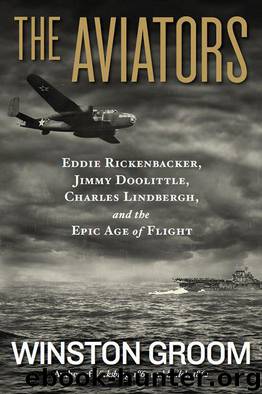The Aviators: Eddie Rickenbacker, Jimmy Doolittle, Charles Lindbergh, and the Epic Age of Flight by Winston Groom

Author:Winston Groom [Groom, Winston]
Language: eng
Format: mobi, epub
ISBN: 9781426211577
Publisher: National Geographic Society
Published: 2013-11-04T18:30:00+00:00
EVERY DAY NEWSPAPERS WERE QUOTING this person or that on what Lindbergh should do with the rest of his life. Some said he ought to start a flying school, others that he ought to be appointed to some high official position in government, and others still with the predictable suggestion that he should become a movie star. Much of the to-do was similar to what Eddie Rickenbacker had endured when he came home a hero from World War I. Huge financial offers were made if Lindbergh would endorse everything from cigarettes to shaving cream to hats and gloves. During the first months it was estimated that these offers totaled at least $6 million.10
Will Rogers, the midwestern humorist, wrote, “There is a hundred and twenty million people in America all ready to tell Lindbergh what to do. The first thing we want to get into our heads is that this boy is not our usual type of hero that we are used to dealing with. He is our prince and our president combined, and I will personally pay benefits to him for the rest of my life to keep him from having to make exhibitions out of himself. We only get one of these in a lifetime.”11 Will Rogers notwithstanding, however, and as the New Republic put it, Lindbergh was “ours. He is no longer permitted to be himself. He is the U.S. personified.”12 In other words, for better or worse—and to his eternal regret—Lindbergh had become public property.
People soon began to argue as to what Lindbergh’s accomplishment “meant,” and two schools of thought emerged. One claimed the feat was the heroic achievement of man over nature; the other asserted it was the ultimate triumph of “the machine,” or science. In either case Lindbergh was the hero, but of exactly what was not clear.
Those who hailed him as a pioneer were on firmer ground. He was compared with Daniel Boone and Davy Crockett, two loners who struggled across the Alleghenies and opened up the western lands beyond. There were also more lofty claims. Heywood Broun in his newspaper column enthused that this “tall young man raised up and let us see the potentialities of the human spirit,” while a Harvard professor gave an address in which he described Lindbergh thusly: “He has come like a shining vision to revive the hope of mankind.” Another speaker put it a bit more succinctly: “He stands out in a grubby world as an inspiration.”
Lindbergh had, in fact, opened up a new frontier, which, in hindsight, was certainly no small feat. A New York Times reporter wrote that “what [Lindbergh] means by the Spirit of St. Louis is really the Spirit of America.” That might or might not have been so. What stands out is that Lindbergh himself at that time had little or no idea of the meaning of the flight of the Spirit other than to land in Paris in one piece, and he was utterly unprepared for the reception and attention that followed.
Download
The Aviators: Eddie Rickenbacker, Jimmy Doolittle, Charles Lindbergh, and the Epic Age of Flight by Winston Groom.epub
This site does not store any files on its server. We only index and link to content provided by other sites. Please contact the content providers to delete copyright contents if any and email us, we'll remove relevant links or contents immediately.
Fanny Burney by Claire Harman(26594)
Empire of the Sikhs by Patwant Singh(23070)
Out of India by Michael Foss(16847)
Leonardo da Vinci by Walter Isaacson(13315)
Small Great Things by Jodi Picoult(7121)
The Six Wives Of Henry VIII (WOMEN IN HISTORY) by Fraser Antonia(5496)
The Wind in My Hair by Masih Alinejad(5091)
A Higher Loyalty: Truth, Lies, and Leadership by James Comey(4950)
The Crown by Robert Lacey(4806)
The Lonely City by Olivia Laing(4798)
Millionaire: The Philanderer, Gambler, and Duelist Who Invented Modern Finance by Janet Gleeson(4464)
The Iron Duke by The Iron Duke(4349)
Papillon (English) by Henri Charrière(4261)
Sticky Fingers by Joe Hagan(4188)
Joan of Arc by Mary Gordon(4099)
Alive: The Story of the Andes Survivors by Piers Paul Read(4018)
Stalin by Stephen Kotkin(3956)
Aleister Crowley: The Biography by Tobias Churton(3628)
Ants Among Elephants by Sujatha Gidla(3459)
